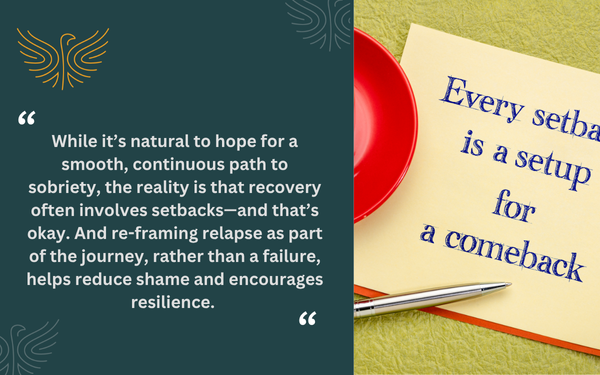Recovery is a process, not a destination. It’s not uncommon for individuals to attend rehab multiple times. In fact, returning to rehab can be an important step in reaffirming one’s commitment to recovery or overcoming a relapse.
If you’re concerned about your health or safety, rehab is a safe bet to ensure you get back on track. A surprising 40-60% of addicts relapse. In many ways, it’s part of the process, and it doesn’t mean you’ve failed. So, what else should you know? How long can you stay in rehab? And how many relapses are normal?
_______________________________________________________
Is It Okay to Go to Rehab More Than Once?
In short, yes. Yet, this can be hard to believe when there continues to be stigmatization not only linked to addiction but also repeated rehab stays. This perspective is both inaccurate and harmful. Recovery is rarely a straight path—it’s a journey that can involve setbacks, learning, and renewed commitment.
In fact, choosing to return to rehab after a relapse or when additional support is needed is a powerful sign of dedication to long-term recovery, not weakness. It takes courage and self-awareness to recognize when more help is needed and to take action.
Ultimately, each rehab experience builds upon the last. With every stay, individuals can gain new tools, fresh perspectives, and deeper insights into their recovery journey. The goal is progress, not perfection. Every step forward, whether it happens after one stay or several, matters.
_______________________________________________________
What’s the Longest You Can Stay in Rehab?
Rehab programs are designed to meet the unique needs of each individual. This means that the length of stay can vary significantly based on personal circumstances and progress.
Typical program lengths include:
- 30 days
- 60 days
- 90 days or longer
In general, longer stays in rehab provide more time for individuals to address the root causes of addiction, strengthen coping skills, and build a more stable foundation for lasting recovery. While a 30-day program can offer a solid start, extended stays of 60 or 90 days often lead to more in-depth healing and sustainable outcomes.
_______________________________________________________
How Many Relapses Are Normal?
While it’s natural to hope for a smooth, continuous path to sobriety, the reality is that recovery often involves setbacks—and that’s okay. And re-framing relapse as part of the journey, rather than a failure, helps reduce shame and encourages resilience.

The truth is that many people experience one or more relapses before achieving sustained recovery. What matters most is how you respond and learn from the experience.
_______________________________________________________
Benefits of Returning to Rehab
Returning to rehab can be a powerful and positive step in the recovery process. Far from signaling failure, it offers valuable opportunities to deepen one’s commitment to long-term sobriety and personal growth. More specifically, the benefits may include:
Opportunity to Reassess and Strengthen Coping Strategies
Each rehab stay provides a chance to evaluate what’s working and what isn’t. Returning to treatment allows individuals to refine their coping skills and build new tools for managing life’s challenges without turning to substances.
Address New or Unresolved Issues
Sometimes, underlying issues, such as trauma, mental health concerns, or relationship dynamics, emerge or evolve over time. But a return to rehab offers a safe space to explore and address these factors in a supportive, therapeutic environment. It also helps you reflect on them, without the temptation of returning to substance use or the stress of various triggers.
Reconnect With a Supportive Community
Isolation can lead to relapse. This is why having a support system is so important, especially during the initial stages of recovery.
Yet, rehab provides a built-in network of peers and professionals who understand the recovery journey. Reconnecting with this community fosters a sense of belonging, accountability, and encouragement.
Reinforcement of Long-Term Recovery Goals
Recovery is an ongoing process. A return to rehab helps individuals refocus on their long-term goals, strengthen their commitment to sobriety, and regain momentum on their personal growth journey. Remember, this is a journey. It doesn’t end when you leave or finish your rehab program.
_______________________________________________________
How To Know If You Should Return To Rehab
Determining whether to return to rehab can be a challenging yet essential decision in your journey. Recognizing when you need more support actually shows that you’re making progress. Here are a few tell-tale signs:
- Repeated relapses
- Difficulty maintaining daily responsibilities and obligations
- Experiencing increasing anxiety or depression
- Experiencing a traumatic event that may trigger substance use
- Lacking confidence in your sobriety and recovery journey
If you’re unsure if returning to rehab is right for you, start by having an open and honest conversation with your network. This may mean bringing it up with your therapist or counselor. It may also be beneficial to discuss your options with a trusted loved one.
Far from being a setback, returning to treatment is a normal and often necessary part of building lasting sobriety. Choosing to return to rehab is often a proactive and courageous step. It reflects a deep commitment to personal growth and a willingness to seek the support needed to thrive.
Above all, remember that recovery requires ongoing support and self-compassion. Be patient with yourself, lean on your community, and honor every step forward, including those that involve asking for help again. Each experience builds strength and resilience, moving you closer to a healthier, more fulfilling life.
At Freedom Recovery Centers (FRC), our team is here to help you take that next step, whether it’s your first or last time in rehab. Together, we can help you stay on track with your recovery and guide you toward a healthier and happier life. Call us at 804-635-3746 or fill out our online form to learn more.
.svg)






.svg)

.svg)



.svg)
